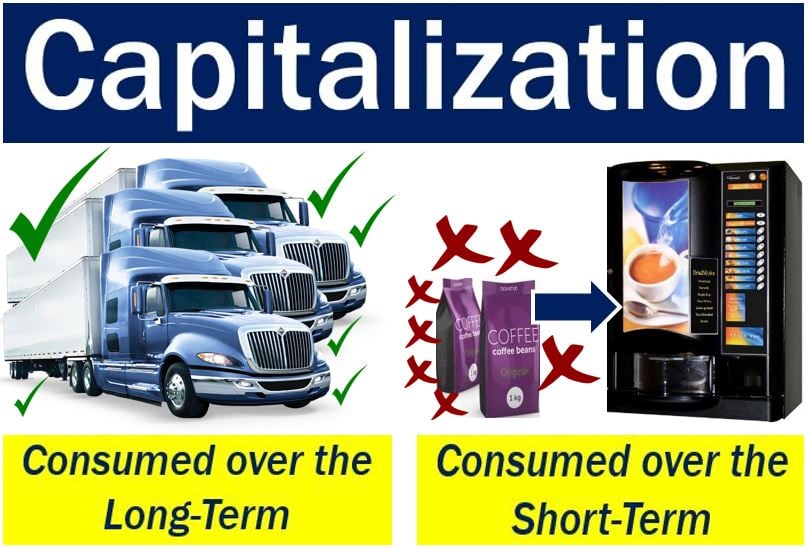Capitalization – definition and meaning
Capitalization is the provision of capital for a business. The term may also refer to the conversion of assets or income into capital. In finance, it is a quantitative assessment of a company’s capital structure. It also means writing in either whole words in capital letters or starting each word with a capital letter.
In accounting, capitalization occurs when we record a cost as an asset rather than an expense. If we do not expect to completely consume the cost in the current period, we can use this approach.
For example, we expect to consume all the staff room coffee in the near future. Therefore, we charge it to expense at once.
However, we record a new truck as a fixed asset. We charge that truck to expense over an extended period through depreciation. In other words, we know that we will consume staff-room coffee completely much faster than the truck.

Capitalization limit
If a cost is very small, we charge it to expense immediately; all in one go. Going through several calculations and journal entries to capitalize it and then gradually charging it to expense is pointless.
The actual amount below which we automatically charge an item to expense is the capitalization limit or cap limit.
We use the limit to keep record-keeping down to a practical and manageable level. At the same time, however, we capitalize the items that we class as fixed assets.
Market Capitalization
Market capitalization or market cap is the value of all the shares that a public company issues. A public company, unlike a private company, sells its shares on the stock market.
We calculate market capitalization by multiplying the total number of shares outstanding by the price of each share. ‘Shares outstanding’ refers to all the shares of a business that it has authorized and issued. It also includes all the shares that investors bought and hold.
It is one of several factors when determining stock valuation, as well as investors’ perception of how much a corporation is worth. However, it is not a factor we use when calculating total asset figures or net sales.
Market capitalization is a pointer regarding the returns and risk for a particular company’s stock. Investors use it as a tool that helps them select stocks that can meet their levels of risk and diversification goals.
According to Dictionary.com, capitalization is:
“1. The act or process of capitalizing. 2. The authorized or outstanding stocks and bonds of a corporation.
3. Accounting – the total investment of the owner or owners in a business enterprise – the total corporate liability – the total arrived at after addition of liabilities.”
“4. Conversion into stocks or bonds. 5. The act of computing the present value of future periodical payments.”
Video – Expense vs. Capitalization
In this video, Alex Guerreros explains what the difference is between an expense a capitalization.

